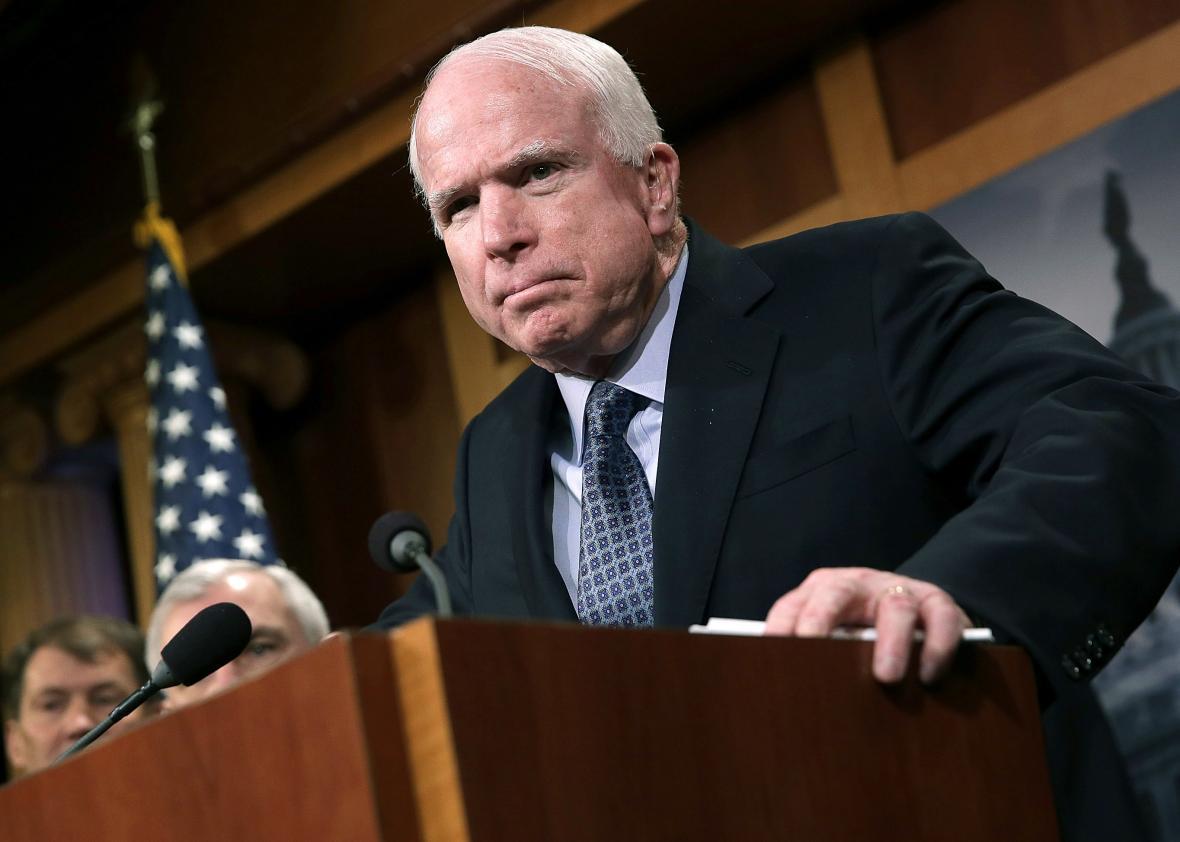The Democratic Party is on the hunt for Russkies. It’s a sensible reflex after an election in which Russia, according to the intelligence community, hacked and leaked Democratic emails to improve Trump’s electoral chances. It deserves an investigation and a diplomatic response. What we do not need, though, is Democrats running into the flexed arms of Sens. Lindsey Graham and John McCain.
Democrats, these are not your foreign policy friends.
Give them points for consistency: Regardless of who’s president, Graham and McCain are the two most vocal hawks in the U.S. Senate. When their hawkishness was targeted at President Obama, Democrats laughed them off as unreconstructed Cold Warriors who couldn’t get with the times. Graham and McCain were deeply critical of Obama’s inability to expel Russia from Crimea and his hesitancy to arm Ukraine against pro-Russian rebels in the east. The U.S. directly escalating a tense regional conflict would have been a major risk for the people living there, and it’s unclear what such a move would have done to change the situation except further inflame it. Graham recognized in 2015 that arming Ukraine may not have changed the regional calculus, but did say that arming Ukraine would have made him “feel better.” Just about every option in Syria is terrible, but both McCain and Graham brush aside any risk that further escalation there—a no-fly zone, say, or ground troops—might backfire, or do more harm than it prevents.
Democrats seemed at one point to recognize that this devil-may-care aggression toward Russia was hyperbolic, but electoral politics has intervened. If Russia as a state actor is, indeed, responsible for the ingenious bit of spycraft whereby someone sent John Podesta phishing emails that he clicked on, then that requires a commensurate response from the U.S. government. What it doesn’t require is for Democrats to look to John McCain and Lindsey Graham as their buddies, a couple of fellow patriots who will put aside partisan considerations to serve the ideal of free and fair elections. They’re not doing this for you, Democrats. They’re doing it because they’ve long harbored a desire for a more aggressive posture toward Russia, and the Democrats, in their disillusionment over Hillary Clinton’s loss, are now the most useful idiots in the room.
The temptation is strong for Democrats to join with the GOP’s Russia hawks, because the numbers add up. On foreign policy issues, the Senate Democratic caucus plus Graham, McCain, and the similarly hawkish Marco Rubio add up to 51 votes—enough to stifle Trump appointees in the post-filibuster era. This is the coalition that could theoretically block Rex Tillerson’s appointment to the State Department on the basis of Tillerson’s business and personal ties to Russia. McCain, Graham, and Rubio have all expressed concerns over Tillerson’s relationship with Putin.
This may be the fight McCain, Graham, and Rubio want to pick. But is it the foreign policy fight Democrats want to pick?
Rex Tillerson is a business guy who flies around the world doing business-guy things. Maybe he’s a “strategic consultant” installation. But it’s better he get his advice from the likes of Bob Gates, Stephen Hadley, James Baker, and Condoleezza Rice than from the person whom Democrats really should be turning their attention to blocking: John Bolton.
Bolton is expected to be Trump’s pick for second-in-command at the State Department—if he wins confirmation. If his selection is finalized, forget about Tillerson or the waiver for “The Mad Dog” or whatever. Stopping Bolton—who on Monday suggested aloud that the Russian hacks may have been an Obama administration false-flag operation—should become the top priority. He is a madman whose only wish is to bomb Iran into oblivion. He is anti-diplomacy personified.
McCain and Graham love John Bolton. McCain gave Bolton a rousing endorsement during his 2005 nomination to serve as U.N. ambassador, a position for which Bolton could not be confirmed and was later installed via recess appointment; Bolton, meanwhile, supported McCain for re-election earlier this year. Graham, in late November, declared himself a “big John Bolton fan.”
There is an ally to be had on that side of the aisle—a GOP senator who’s not just toying with the idea of rejecting Bolton, but who has already rejected him. Sen. Rand Paul has said that he will be an “automatic no” on Bolton for any job to which he’s nominated. “If he were to be the assistant or the undersecretary for Tillerson,” Paul said over the weekend, “I’m an out automatic no on Bolton. He should get nowhere close to the State Department if anybody with the same worldview is in charge.” On Tillerson, he would keep an open mind. “I don’t know that yet,” he said. “And to me the most important question is, are you an advocate for the Iraq war? Do you think that was a good idea? Do you think, regime change? Because, see, these questions keep recurring.”
Those would be some useful questions for Democrats, too, to ask all of Donald Trump’s foreign policy picks. It would be a far greater use of time than conspiring with the likes of John McCain and Lindsey Graham to stick it to Putin. It would be quite a feat if the Donald Trump presidency successfully converted Democrats into the same Cold Warriors they mocked not that long ago as unhinged Russophobes. Democrats can take out their rage over the phishing emails by just telling Trump over and over that he only won the election because of Vladimir Putin. It makes him mad and delegitimizes him. When it comes to foreign policy critiques, though, they would do well to ensure they’re making the right alliances.
